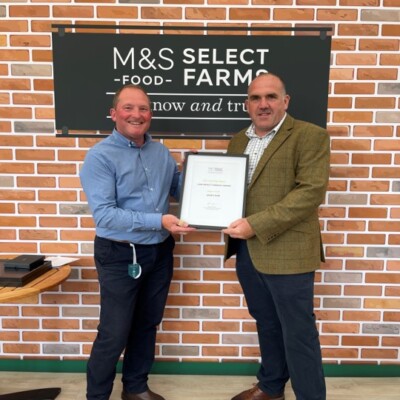Nestled in the stunning Cambrian Mountains in mid Wales, Tyllwyd Farm is where you’ll find James Raw, a seventh-generation farmer who farms in partnership alongside his mother and his wife, Claire. The family have been farming the land at Tyllwyd since 1850, and it has since been recognised as a Site of Special Scientific Interest (SSSI), a conservation designation designed to protect areas of land or water that are considered particularly valuable for their wildlife, geology or landform features.
The farm is home to a herd of 35 pure Limousin suckler cows and a flock of 850-900 ewes, which is significantly less than that of some 20 years ago, where numbers would have been in their thousands. However, lambing percentages have risen to 150%, so although the flock number has reduced, the number of lambs sold are relatively similar. Reducing the amount of stock held on the farm ensures that all animals are able to be kept on their land throughout the year, reducing costs for the family business.
When it comes to farming, the family’s ethos is very much to maximise the potential of what’s available to them, whilst not over-complicating anything. James is passionate about farming in harmony with nature and the environment, and utilising the land’s natural resources.
Speaking about Welsh farming, James comments,
“We are producing the best red meat in the world, with the highest environmental and welfare standards.”
James has implemented a range of practices and projects on his farm, including the creation of two hydro systems and a farming system that focuses on soil health and biodiversity. Back in 2010, the family implemented two hydro schemes on their land, following the success of a similar, smaller system implemented by James’ grandfather in the 1950s.
The hydroelectric scheme on farm now produces almost enough electric to power 250 homes in the local area, annually. In addition, the lifelong carbon saving contribution of the hydro scheme is equal to planting 700,000 trees or 1,000 acres of woodland, which showcases the huge potential and benefits of hydro power.
Recognition.
Last year, James was awarded the prestigious ‘Low Impact Award’ (quite possibly the worst titled award imaginable!) in the annual M&S Select Farm Awards for England and Wales. The award was given as a result of all of the sustainable practices implemented on the farm. From planting 3-4km of hedgerows and creating new natural corridors, to creating new woodland and utilising a huge amount of their own larch for fencing and cladding on outbuildings – each of these actions has helped to increase biodiversity on farm and lower the impact on the environment. James reflects,
“Sustainability is quite the buzz word at the moment – and rightly so, but as farmers I don’t think we’re the best at conveying the positive things we do and it’s nice to be able to portray the positive actions that most of us do on our farms daily. “
What’s next for the Raw family?
James has recently embarked on a project to see if there is anything that can be done to improve the soil health of peatland, and how best to manage the land. The majority of hill land on the farm is peat bogs, and thus there is little that can be done to affect the soil health. However, James is hopeful that the peatland project can offer some insight into combatting this.
The family also have high hopes that their 18-year-old son will be keen to take the family business to its next chapter – making him the 8th generation to take care of the land!
Watch this space…
